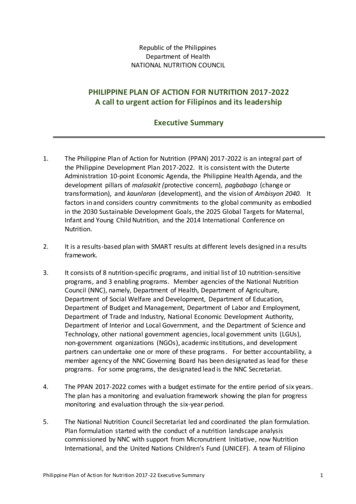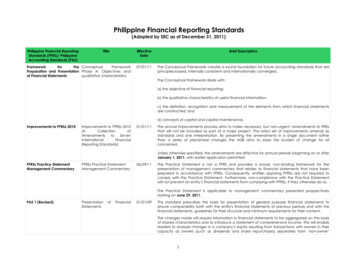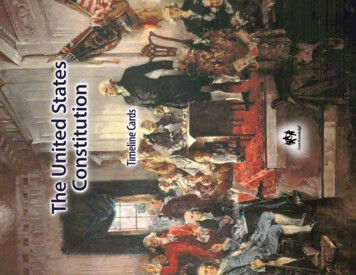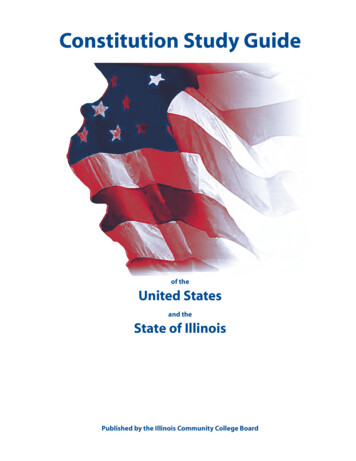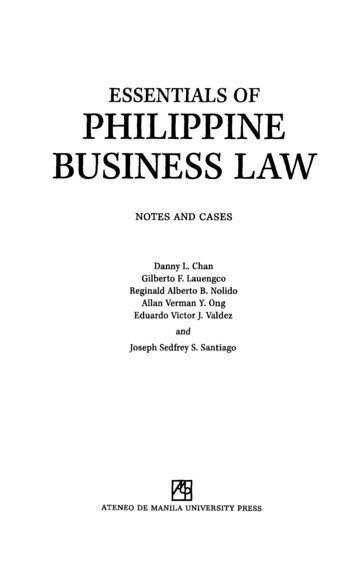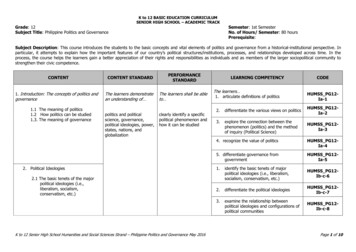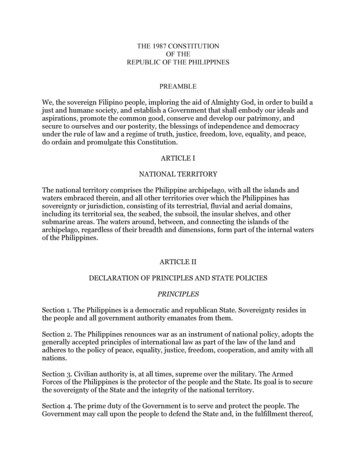
Transcription
THE 1987 CONSTITUTIONOF THEREPUBLIC OF THE PHILIPPINESPREAMBLEWe, the sovereign Filipino people, imploring the aid of Almighty God, in order to build ajust and humane society, and establish a Government that shall embody our ideals andaspirations, promote the common good, conserve and develop our patrimony, andsecure to ourselves and our posterity, the blessings of independence and democracyunder the rule of law and a regime of truth, justice, freedom, love, equality, and peace,do ordain and promulgate this Constitution.ARTICLE INATIONAL TERRITORYThe national territory comprises the Philippine archipelago, with all the islands andwaters embraced therein, and all other territories over which the Philippines hassovereignty or jurisdiction, consisting of its terrestrial, fluvial and aerial domains,including its territorial sea, the seabed, the subsoil, the insular shelves, and othersubmarine areas. The waters around, between, and connecting the islands of thearchipelago, regardless of their breadth and dimensions, form part of the internal watersof the Philippines.ARTICLE IIDECLARATION OF PRINCIPLES AND STATE POLICIESPRINCIPLESSection 1. The Philippines is a democratic and republican State. Sovereignty resides inthe people and all government authority emanates from them.Section 2. The Philippines renounces war as an instrument of national policy, adopts thegenerally accepted principles of international law as part of the law of the land andadheres to the policy of peace, equality, justice, freedom, cooperation, and amity with allnations.Section 3. Civilian authority is, at all times, supreme over the military. The ArmedForces of the Philippines is the protector of the people and the State. Its goal is to securethe sovereignty of the State and the integrity of the national territory.Section 4. The prime duty of the Government is to serve and protect the people. TheGovernment may call upon the people to defend the State and, in the fulfillment thereof,
all citizens may be required, under conditions provided by law, to render personal,military or civil service.Section 5. The maintenance of peace and order, the protection of life, liberty, andproperty, and promotion of the general welfare are essential for the enjoyment by all thepeople of the blessings of democracy.Section 6. The separation of Church and State shall be inviolable.STATE POLICIESSection 7. The State shall pursue an independent foreign policy. In its relations withother states, the paramount consideration shall be national sovereignty, territorialintegrity, national interest, and the right to self-determination.Section 8. The Philippines, consistent with the national interest, adopts and pursues apolicy of freedom from nuclear weapons in its territory.Section 9. The State shall promote a just and dynamic social order that will ensure theprosperity and independence of the nation and free the people from poverty throughpolicies that provide adequate social services, promote full employment, a risingstandard of living, and an improved quality of life for all.Section 10. The State shall promote social justice in all phases of national development.Section 11. The State values the dignity of every human person and guarantees fullrespect for human rights.Section 12. The State recognizes the sanctity of family life and shall protect andstrengthen the family as a basic autonomous social institution. It shall equally protectthe life of the mother and the life of the unborn from conception. The natural andprimary right and duty of parents in the rearing of the youth for civic efficiency and thedevelopment of moral character shall receive the support of the Government.Section 13. The State recognizes the vital role of the youth in nation-building and shallpromote and protect their physical, moral, spiritual, intellectual, and social well-being.It shall inculcate in the youth patriotism and nationalism, and encourage theirinvolvement in public and civic affairs.Section 14. The State recognizes the role of women in nation-building, and shall ensurethe fundamental equality before the law of women and men.Section 15. The State shall protect and promote the right to health of the people andinstill health consciousness among them.
Section 16. The State shall protect and advance the right of the people to a balanced andhealthful ecology in accord with the rhythm and harmony of nature.Section 17. The State shall give priority to education, science and technology, arts,culture, and sports to foster patriotism and nationalism, accelerate social progress, andpromote total human liberation and development.Section 18. The State affirms labor as a primary social economic force. It shall protectthe rights of workers and promote their welfare.Section 19. The State shall develop a self-reliant and independent national economyeffectively controlled by Filipinos.Section 20. The State recognizes the indispensable role of the private sector, encouragesprivate enterprise, and provides incentives to needed investments.Section 21. The State shall promote comprehensive rural development and agrarianreform.Section 22. The State recognizes and promotes the rights of indigenous culturalcommunities within the framework of national unity and development.Section 23. The State shall encourage non-governmental, community-based, or sectoralorganizations that promote the welfare of the nation.Section 24. The State recognizes the vital role of communication and information innation-building.Section 25. The State shall ensure the autonomy of local governments.Section 26. The State shall guarantee equal access to opportunities for public service andprohibit political dynasties as may be defined by law.Section 27. The State shall maintain honesty and integrity in the public service and takepositive and effective measures against graft and corruption.Section 28. Subject to reasonable conditions prescribed by law, the State adopts andimplements a policy of full public disclosure of all its transactions involving publicinterest.ARTICLE IIIBILL OF RIGHTSSection 1. No person shall be deprived of life, liberty, or property without due process oflaw, nor shall any person be denied the equal protection of the laws.
Section 2. The right of the people to be secure in their persons, houses, papers, andeffects against unreasonable searches and seizures of whatever nature and for anypurpose shall be inviolable, and no search warrant or warrant of arrest shall issue exceptupon probable cause to be determined personally by the judge after examination underoath or affirmation of the complainant and the witnesses he may produce, andparticularly describing the place to be searched and the persons or things to be seized.Section 3. (1) The privacy of communication and correspondence shall be inviolableexcept upon lawful order of the court, or when public safety or order requires otherwise,as prescribed by law.(2) Any evidence obtained in violation of this or the preceding section shall beinadmissible for any purpose in any proceeding.Section 4. No law shall be passed abridging the freedom of speech, of expression, or ofthe press, or the right of the people peaceably to assemble and petition the governmentfor redress of grievances.Section 5. No law shall be made respecting an establishment of religion, or prohibitingthe free exercise thereof. The free exercise and enjoyment of religious profession andworship, without discrimination or preference, shall forever be allowed. No religioustest shall be required for the exercise of civil or political rights.Section 6. The liberty of abode and of changing the same within the limits prescribed bylaw shall not be impaired except upon lawful order of the court. Neither shall the rightto travel be impaired except in the interest of national security, public safety, or publichealth, as may be provided by law.Section 7. The right of the people to information on matters of public concern shall berecognized. Access to official records, and to documents and papers pertaining to officialacts, transactions, or decisions, as well as to government research data used as basis forpolicy development, shall be afforded the citizen, subject to such limitations as may beprovided by law.Section 8. The right of the people, including those employed in the public and privatesectors, to form unions, associations, or societies for purposes not contrary to law shallnot be abridged.Section 9. Private property shall not be taken for public use without just compensation.Section 10. No law impairing the obligation of contracts shall be passed.Section 11. Free access to the courts and quasi-judicial bodies and adequate legalassistance shall not be denied to any person by reason of poverty.Section 12. (1) Any person under investigation for the commission of an offense shallhave the right to be informed of his right to remain silent and to have competent and
independent counsel preferably of his own choice. If the person cannot afford theservices of counsel, he must be provided with one. These rights cannot be waived exceptin writing and in the presence of counsel.(2) No torture, force, violence, threat, intimidation, or any other means which vitiate thefree will shall be used against him. Secret detention places, solitary, incommunicado, orother similar forms of detention are prohibited.(3) Any confession or admission obtained in violation of this or Section 17 hereof shallbe inadmissible in evidence against him.(4) The law shall provide for penal and civil sanctions for violations of this section aswell as compensation to the rehabilitation of victims of torture or similar practices, andtheir families.Section 13. All persons, except those charged with offenses punishable by reclusionperpetua when evidence of guilt is strong, shall, before conviction, be bailable bysufficient sureties, or be released on recognizance as may be provided by law. The rightto bail shall not be impaired even when the privilege of the writ of habeas corpus issuspended. Excessive bail shall not be required.Section 14. (1) No person shall be held to answer for a criminal offense without dueprocess of law.(2) In all criminal prosecutions, the accused shall be presumed innocent until thecontrary is proved, and shall enjoy the right to be heard by himself and counsel, to beinformed of the nature and cause of the accusation against him, to have a speedy,impartial, and public trial, to meet the witnesses face to face, and to have compulsoryprocess to secure the attendance of witnesses and the production of evidence in hisbehalf. However, after arraignment, trial may proceed notwithstanding the absence ofthe accused: Provided, that he has been duly notified and his failure to appear isunjustifiable.Section 15. The privilege of the writ of habeas corpus shall not be suspended except incases of invasion or rebellion, when the public safety requires it.Section 16. All persons shall have the right to a speedy disposition of their cases beforeall judicial, quasi-judicial, or administrative bodies.Section 17. No person shall be compelled to be a witness against himself.Section 18. (1) No person shall be detained solely by reason of his political beliefs andaspirations.(2) No involuntary servitude in any form shall exist except as a punishment for a crimewhereof the party shall have been duly convicted.
Section 19. (1) Excessive fines shall not be imposed, nor cruel, degrading or inhumanpunishment inflicted. Neither shall death penalty be imposed, unless, for compellingreasons involving heinous crimes, the Congress hereafter provides for it. Any deathpenalty already imposed shall be reduced to reclusion perpetua.(2) The employment of physical, psychological, or degrading punishment against anyprisoner or detainee or the use of substandard or inadequate penal facilities undersubhuman conditions shall be dealt with by law.Section 20. No person shall be imprisoned for debt or non-payment of a poll tax.Section 21. No person shall be twice put in jeopardy of punishment for the same offense.If an act is punished by a law and an ordinance, conviction or acquittal under eithershall constitute a bar to another prosecution for the same act.Section 22. No ex post facto law or bill of attainder shall be enacted.ARTICLE IVCITIZENSHIPSection 1. The following are citizens of the Philippines:[1] Those who are citizens of the Philippines at the time of the adoption of thisConstitution;[2] Those whose fathers or mothers are citizens of the Philippines;[3] Those born before January 17, 1973, of Filipino mothers, who elect Philippinecitizenship upon reaching the age of majority; and[4] Those who are naturalized in accordance with law.Section 2. Natural-born citizens are those who are citizens of the Philippines from birthwithout having to perform any act to acquire or perfect their Philippine citizenship.Those who elect Philippine citizenship in accordance with paragraph (3), Section 1hereof shall be deemed natural-born citizens.Section 3. Philippine citizenship may be lost or reacquired in the manner provided bylaw.Section 4. Citizens of the Philippines who marry aliens shall retain their citizenship,unless by their act or omission, they are deemed, under the law, to have renounced it.Section 5. Dual allegiance of citizens is inimical to the national interest and shall bedealt with by law.
ARTICLE VSUFFRAGESection 1. Suffrage may be exercised by all citizens of the Philippines not otherwisedisqualified by law, who are at least eighteen years of age, and who shall have resided inthe Philippines for at least one year, and in the place wherein they propose to vote, for atleast six months immediately preceding the election. No literacy, property, or othersubstantive requirement shall be imposed on the exercise of suffrage.Section 2. The Congress shall provide a system for securing the secrecy and sanctity ofthe ballot as well as a system for absentee voting by qualified Filipinos abroad.The Congress shall also design a procedure for the disabled and the illiterates to votewithout the assistance of other persons. Until then, they shall be allowed to vote underexisting laws and such rules as the Commission on Elections may promulgate to protectthe secrecy of the ballot.ARTICLE VITHE LEGISLATIVE DEPARTMENTSection 1. The legislative power shall be vested in the Congress of the Philippines whichshall consist of a Senate and a House of Representatives, except to the extent reserved tothe people by the provision on initiative and referendum.Section 2. The Senate shall be composed of twenty-four Senators who shall be elected atlarge by the qualified voters of the Philippines, as may be provided by law.Section 3. No person shall be a Senator unless he is a natural-born citizen of thePhilippines and, on the day of the election, is at least thirty-five years of age, able to readand write, a registered voter, and a resident of the Philippines for not less than two yearsimmediately preceding the day of the election.Section 4. The term of office of the Senators shall be six years and shall commence,unless otherwise provided by law, at noon on the thirtieth day of June next followingtheir election. No Senator shall serve for more than two consecutive terms. Voluntaryrenunciation of the office for any length of time shall not be considered as aninterruption in the continuity of his service for the full term of which he was elected.Section 5. (1) The House of Representatives shall be composed of not more than twohundred and fifty members, unless otherwise fixed by law, who shall be elected fromlegislative districts apportioned among the provinces, cities, and the MetropolitanManila area in accordance with the number of their respective inhabitants, and on thebasis of a uniform and progressive ratio, and those who, as provided by law, shall be
elected through a party-list system of registered national, regional, and sectoral partiesor organizations.(2) The party-list representatives shall constitute twenty per centum of the total numberof representatives including those under the party list. For three consecutive terms afterthe ratification of this Constitution, one-half of the seats allocated to party-listrepresentatives shall be filled, as provided by law, by selection or election from thelabor, peasant, urban poor, indigenous cultural communities, women, youth, and suchother sectors as may be provided by law, except the religious sector.(3) Each legislative district shall comprise, as far as practicable, contiguous, compact,and adjacent territory. Each city with a population of at least two hundred fiftythousand, or each province, shall have at least one representative.(4) Within three years following the return of every census, the Congress shall make areapportionment of legislative districts based on the standards provided in this section.Section 6. No person shall be a Member of the House of Representatives unless he is anatural-born citizen of the Philippines and, on the day of the election, is at least twentyfive years of age, able to read and write, and, except the party-list representatives, aregistered voter in the district in which he shall be elected, and a resident thereof for aperiod of not less than one year immediately preceding the day of the election.Section 7. The Members of the House of Representatives shall be elected for a term ofthree years which shall begin, unless otherwise provided by law, at noon on the thirtiethday of June next following their election. No Member of the House of Representativesshall serve for more than three consecutive terms. Voluntary renunciation of the officefor any length of time shall not be considered as an interruption in the continuity of hisservice for the full term for which he was elected.Section 8. Unless otherwise provided by law, the regular election of the Senators and theMembers of the House of Representatives shall be held on the second Monday of May.Section 9. In case of vacancy in the Senate or in the House of Representatives, a specialelection may be called to fill such vacancy in the manner prescribed by law, but theSenator or Member of the House of Representatives thus elected shall serve only for theunexpired term.Section 10. The salaries of Senators and Members of the House of Representatives shallbe determined by law. No increase in said compensation shall take effect until after theexpiration of the full term of all the Members of the Senate and the House ofRepresentatives approving such increase.Section 11. A Senator or Member of the House of Representatives shall, in all offensespunishable by not more than six years imprisonment, be privileged from arrest while theCongress is in session. No Member shall be questioned nor be held liable in any otherplace for any speech or debate in the Congress or in any committee thereof.
Section 12. All Members of the Senate and the House of Representatives shall, uponassumption of office, make a full disclosure of their financial and business interests.They shall notify the House concerned of a potential conflict of interest that may arisefrom the filing of a proposed legislation of which they are authors.Section 13. No Senator or Member of the House of Representatives may hold any otheroffice or employment in the Government, or any subdivision, agency, or instrumentalitythereof, including government-owned or controlled corporations or their subsidiaries,during his term without forfeiting his seat. Neither shall he be appointed to any officewhich may have been created or the emoluments thereof increased during the term forwhich he was elected.Section 14. No Senator or Member of the House of Representatives may personallyappear as counsel before any court of justice or before the Electoral Tribunals, or quasijudicial and other administrative bodies. Neither shall he, directly or indirectly, beinterested financially in any contract with, or in any franchise or special privilegegranted by the Government, or any subdivision, agency, or instrumentality thereof,including any government-owned or controlled corporation, or its subsidiary, during histerm of office. He shall not intervene in any matter before any office of the Governmentfor his pecuniary benefit or where he may be called upon to act on account of his office.Section 15. The Congress shall convene once every year on the fourth Monday of July forits regular session, unless a different date is fixed by law, and shall continue to be insession for such number of days as it may determine until thirty days before the openingof its next regular session, exclusive of Saturdays, Sundays, and legal holidays. ThePresident may call a special session at any time.Section 16. (1). The Senate shall elect its President and the House of Representatives, itsSpeaker, by a majority vote of all its respective Members. Each House shall choose suchother officers as it may deem necessary.(2) A majority of each House shall constitute a quorum to do business, but a smallernumber may adjourn from day to day and may compel the attendance of absentMembers in such manner, and under such penalties, as such House may provide.(3) Each House may determine the rules of its proceedings, punish its Members fordisorderly behavior, and, with the concurrence of two-thirds of all its Members, suspendor expel a Member. A penalty of suspension, when imposed, shall not exceed sixty days.(4) Each House shall keep a Journal of its proceedings, and from time to time publishthe same, excepting such parts as may, in its judgment, affect national security; and theyeas and nays on any question shall, at the request of one-fifth of the Members present,be entered in the Journal. Each House shall also keep a Record of its proceedings.(5) Neither House during the sessions of the Congress shall, without the consent of theother, adjourn for more than three days, nor to any other place than that in which thetwo Houses shall be sitting.
Section 17. The Senate and the House of Representatives shall each have an ElectoralTribunal which shall be the sole judge of all contests relating to the election, returns,and qualifications of their respective Members. Each Electoral Tribunal shall becomposed of nine Members, three of whom shall be Justices of the Supreme Court to bedesignated by the Chief Justice, and the remaining six shall be Members of the Senate orthe House of Representatives, as the case may be, who shall be chosen on the basis ofproportional representation from the political parties and the parties or organizationsregistered under the party-list system represented therein. The senior Justice in theElectoral Tribunal shall be its Chairman.Section 18. There shall be a Commission on Appointments consisting of the President ofthe Senate, as ex officio Chairman, twelve Senators, and twelve Members of the Houseof Representatives, elected by each House on the basis of proportional representationfrom the political parties and parties or organizations registered under the party-listsystem represented therein. The chairman of the Commission shall not vote, except incase of a tie. The Commission shall act on all appointments submitted to it within thirtysession days of the Congress from their submission. The Commission shall rule by amajority vote of all the Members.Section 19. The Electoral Tribunals and the Commission on Appointments shall beconstituted within thirty days after the Senate and the House of Representatives shallhave been organized with the election of the President and the Speaker. TheCommission on Appointments shall meet only while the Congress is in session, at thecall of its Chairman or a majority of all its Members, to discharge such powers andfunctions as are herein conferred upon it.Section 20. The records and books of accounts of the Congress shall be preserved and beopen to the public in accordance with law, and such books shall be audited by theCommission on Audit which shall publish annually an itemized list of amounts paid toand expenses incurred for each Member.Section 21. The Senate or the House of Representatives or any of its respectivecommittees may conduct inquiries in aid of legislation in accordance with its dulypublished rules of procedure. The rights of persons appearing in, or affected by, suchinquiries shall be respected.Section 22. The heads of departments may, upon their own initiative, with the consentof the President, or upon the request of either House, as the rules of each House shallprovide, appear before and be heard by such House on any matter pertaining to theirdepartments. Written questions shall be submitted to the President of the Senate or theSpeaker of the House of Representatives at least three days before their scheduledappearance. Interpellations shall not be limited to written questions, but may covermatters related thereto. When the security of the State or the public interest so requiresand the President so states in writing, the appearance shall be conducted in executivesession.
Section 23. (1) The Congress, by a vote of two-thirds of both Houses in joint sessionassembled, voting separately, shall have the sole power to declare the existence of a stateof war.(2) In times of war or other national emergency, the Congress may, by law, authorize thePresident, for a limited period and subject to such restrictions as it may prescribe, toexercise powers necessary and proper to carry out a declared national policy. Unlesssooner withdrawn by resolution of the Congress, such powers shall cease upon the nextadjournment thereof.Section 24. All appropriation, revenue or tariff bills, bills authorizing increase of thepublic debt, bills of local application, and private bills, shall originate exclusively in theHouse of Representatives, but the Senate may propose or concur with amendments.Section 25. (1) The Congress may not increase the appropriations recommended by thePresident for the operation of the Government as specified in the budget. The form,content, and manner of preparation of the budget shall be prescribed by law.(2) No provision or enactment shall be embraced in the general appropriations billunless it relates specifically to some particular appropriation therein. Any suchprovision or enactment shall be limited in its operation to the appropriation to which itrelates.(3) The procedure in approving appropriations for the Congress shall strictly follow theprocedure for approving appropriations for other departments and agencies.(4) A special appropriations bill shall specify the purpose for which it is intended, andshall be supported by funds actually available as certified by the National Treasurer, orto be raised by a corresponding revenue proposal therein.(5) No law shall be passed authorizing any transfer of appropriations; however, thePresident, the President of the Senate, the Speaker of the House of Representatives, theChief Justice of the Supreme Court, and the heads of Constitutional Commissions may,by law, be authorized to augment any item in the general appropriations law for theirrespective offices from savings in other items of their respective appropriations.(6) Discretionary funds appropriated for particular officials shall be disbursed only forpublic purposes to be supported by appropriate vouchers and subject to such guidelinesas may be prescribed by law.(7) If, by the end of any fiscal year, the Congress shall have failed to pass the generalappropriations bill for the ensuing fiscal year, the general appropriations law for thepreceding fiscal year shall be deemed re-enacted and shall remain in force and effectuntil the general appropriations bill is passed by the Congress.Section 26. (1) Every bill passed by the Congress shall embrace only one subject whichshall be expressed in the title thereof.
(2) No bill passed by either House shall become a law unless it has passed three readingson separate days, and printed copies thereof in its final form have been distributed to itsMembers three days before its passage, except when the President certifies to thenecessity of its immediate enactment to meet a public calamity or emergency. Upon thelast reading of a bill, no amendment thereto shall be allowed, and the vote thereon shallbe taken immediately thereafter, and the yeas and nays entered in the Journal.Section 27. (1) Every bill passed by the Congress shall, before it becomes a law, bepresented to the President. If he approves the same he shall sign it; otherwise, he shallveto it and return the same with his objections to the House where it originated, whichshall enter the objections at large in its Journal and proceed to reconsider it. If, aftersuch reconsideration, two-thirds of all the Members of such House shall agree to passthe bill, it shall be sent, together with the objections, to the other House by which it shalllikewise be reconsidered, and if approved by two-thirds of all the Members of thatHouse, it shall become a law. In all such cases, the votes of each House shall bedetermined by yeas or nays, and the names of the Members voting for or against shallbe entered in its Journal. The President shall communicate his veto of any bill to theHouse where it originated within thirty days after the date of receipt thereof, otherwise,it shall become a law as if he had signed it.(2) The President shall have the power to veto any particular item or items in anappropriation, revenue, or tariff bill, but the veto shall not affect the item or items towhich he does not object.Section 28. (1) The rule of taxation shall be uniform and equitable. The Congress shallevolve a progressive system of taxation.(2) The Congress may, by law, authorize the President to fix within specified limits, andsubject to such limitations and restrictions as it may impose, tariff rates, import andexport quotas, tonnage and wharfage dues, and other duties or imposts within theframework of the nati
the free exercise thereof. The free exercise and enjoyment of religious profession and worship, without discrimination or preference, shall forever be allowed. No religious test shall be required for the exercise of civil or political rights. Section 6. The liberty of abode



